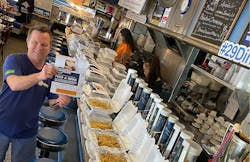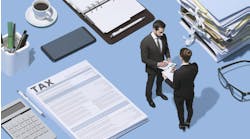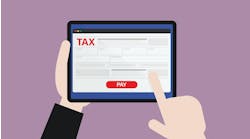Toward the end of March, auto repair shops were given a classification that many other small business owners were not so lucky to get—essential business.
That was a leg up on many other small businesses. Beyond that, it was every person for his or herself. What shop owners chose to do with their designation and the time that they had with their customers rested solely on them. Unfortunately, many shops were not able to make it and many more had to make difficult decisions, such as laying off good employees. Many continue to suffer financially and are taking each day at a time.
In order to succeed, now is the time to take the essential business designation and wear it as a badge of honor. Earn it. Earn it from your employees, earn it from your customers and by doing this, you’ll survive this and the next obstacle that is sure to come your way.
Catching Fire
Craig Noel’s 15-year-old son, Tyler, passed away from a rare disease that caused physical and mental handicaps and respiratory complications in 2007. Throughout his life, Tyler suffered pneumonia 4-6 times per year and was often visited by the paramedics. So, when COVID-19, a respiratory disease, was starting to be talked about overseas, Noel paid more attention than many as it struck a personal chord with him.
“COVID-19 really hits home with Marci [Craig’s wife] and I because of how directly it was relatable [to their life],” Noel says.
From a personal standpoint, Noel was all ears. He was well aware of the impact diseases like this can have. But, from a business standpoint, the owner of the 3-locations of Sun Automotive in Oregon didn’t feel an impact until the second week in March.
It was around this time that stay-at-home issues were put in place, forcing many small businesses to shut their doors—and some, unfortunately, forever.
Business as (Un)usual
In mid-March, Ratchet+Wrench surveyed nearly 1,000 shop owners on the pandemic’s impact. Of those, 78 percent said they altered their business and 88 percent had experienced a negative impact [See: COVID-19’s Impact on Business].
“It’s an ever-changing landscape, almost hour by hour,” Josh Bird, owner of the 1,500-square foot $370,000 per year Bird Automotive in Oak Grove, Mo., says of the new reality that small business owners around the nation are now living in.
At this point, it’s hard to know how businesses will rebound, Aaron Lowe, senior vice president, regulatory and government affairs, Auto Care Association, says.
Stopping the Bleeding
Although Brad Jenner, owner of the $1.2 million per year Affordable Automotive Repair in Fredericksburg, Va., saw a steep drop in car count from an average of 100 cars per week to anywhere between 25–50 during the pandemic, he’s been able to retain his staff of 7. One way he’s done this is by cutting his budget where he can. For example, Jenner cut almost all of his advertising budget for new customer acquisitions and is focusing his efforts on getting the word out to his loyal customers.
Applying for funding from the government and asking for delayed payments from vendors were other strategies for staying afloat, as well as cutting non-essential costs.
Safety First
This pandemic has changed how people interact—perhaps forever. The days of gaining a customer’s trust with a handshake are on hold. It’s about a new kind of business interaction, Jim Lang, president of Lang Marketing, says, revolving around reducing social interaction.
In order to maintain customers in this “new normal,” businesses need to find a way to create a frictionless, non-threatening experience for customers, Lang explains. Since the aftermarket has always been a primarily person-to-person type business, it will be a major adjustment.
According to Lang, this may give MSOs and dealerships a leg up, as they’ll have more resources to be able to provide measures like larger waiting rooms, sanitation supplies and staffing to allow for pick up and drop off. However, many independent shops, including Bird’s, are offering pick-up and drop-offs and offering touchless transactions.
Advertising “Essential”
When paramedics save your child’s life 10+ times, you develop a deep respect for what they do, Noel explains.
Noel had to call first responders often, and he says that the personal relationship that he developed with them helped him and his family get through an extremely difficult time.
“We knew all of the EMT drivers by name,” Noel says. “They knew who I was—it was like that throughout his entire life.”
Tyler’s physician, in particular, went out of his way to create a personal relationship with Noel and his family. Noel continues to hold those in the medical field in the highest regard and, when the pandemic hit, he knew he wanted to find a way to support them.
“My heart goes out to them,” Noel says.
Noel started a campaign for free oil changes for medical workers.
Noel didn’t do it for the publicity, but the campaign has helped get his name out there and his monthly revenue for April 2020 is better than it was in April 2019 ($110,000 versus $109,000). At the end of April, the 3-locations saw 60 first responders take advantage of the campaign, and was scheduled a week out for the service. The campaign helped stabilize car count and contribute to an ARO of $624.
“We are on pace for a year-over-year record for April and have not even needed to consider any layoffs whereas the dealers and other local independents have had to make serious decisions and laid many off,” Noel says. “We have been the strongest independent repair shop in the county.”
Sun Automotive’s free lube, oil and filter changes for front line medical personnel and first responders through Memorial Day is just one example. Co-owners of the four-location Craftsman Auto Care in Virginia and husband-and-wife team Matt and Judy Curry, created the “Feed a Hero Campaign,” which, as of the first week in May, raised $32,000 and provided 3,000 meals to medical responders. Bird is buying two gift $25 gift cards per week from local businesses that he’ll use for promotions or giveaways later in the year.
Clearly Communicate
During the first few weeks of the stay-at-home order, Noel realized that many of his customers did not know that his shop was considered “essential.”
“The general consensus was that it was police and firefighters, not auto repair,” Noel says.
Lowe says that this is one of the issues with which the Auto Care Association has dealt. Creating a promotion like Noel’s thank you to first responders helped draw awareness that his business is indeed open.
Prasanth Chilukuri, co-founder and CFO of information provider Tekmetric, says that shop owners need to “market like crazy,” and let their customers know that not only are they open—but they haven’t forgotten about them.
Noel, for example, is reaching out to all of his customers that haven’t been in the last year and that have had repair recommendations.
Reframe the Message
Now is not the time to be pushing a promotion vehicle check-ups “just in time for a summer vacation.”
The Currys had to change their messaging overnight and continue to adjust what they put out. When the virus first hit, they released videos explaining their hygiene and safety protocols.
“Everything we can do to make them [customers] feel comfortable and calm,” Judy says. “We’re trying to be leaders and put the message out there that we’re here to serve the community.”
Not only did the message need to change, but the frequency did as well. Instead of sending out its newsletter every two weeks, they increased to weekly.
Sun Automotive’s homepage has a message to its customers about COVID-19. The message clearly outlines the company’s focus (the health and safety of the community) and measures (pick-up and drop-off and delivery services). Smaller adjustments that could easily be forgotten, like getting the new hours on the website, also need to be done, Judy says.
Seeing the Light
During the Great Recession, Noel was working as a technician and a service advisor. In 2007, his son passed away. While he was dealing with a profound loss, he was also experiencing an extremely stressful time in the economy—much like what is going on right now.
“I felt that, He doesn’t give you any more than you can handle. How much worse could it be?” Noel says.
During a time when many were losing their jobs, Noel decided to go after what he always wanted—a position in management. During this time, Noel actually took a pay cut to train as a service advisor so he could get the experience and knowledge that he needed. While doing this, he was introduced to the former owner of Sun Automotive. If it wasn’t for all of that he went through during that time, Noel says he wouldn’t be in the position that he is today.
Every experience is a lesson, and Noel has a wealth of knowledge when it comes to overcoming adversity.
“We have to remember that, just because they turn the light switch back on, things will not return to normal,” Noel says. “There are people that have been displaced. What I’m preparing for is people not having a job and they’ll make decisions similar to the 2008 financial crisis.”
Luckily for the independent shop owner, that bodes well. Since there won’t be the money to purchase new vehicles, many will need to maintain the cars they already have and may actually bring more business than normal.
Prepare for an Uptick
“For those that survive, it will be a really good summer,” Bird says. “I think it could be one of the best summers ever for auto repair.”
He’s not alone in that sentiment. Lang says that this pandemic will impact the average age of vehicles on the road and that new car sales will go down. Bird has started to see this, as he reports April was his best month yet, with a car count of 80 and an ARO of $445 for his two-person shop.
When life returns to whatever the new normal will be, businesses need to be prepared for an immediate uptick.
“It will turn around—it’s just a question of how long it will take,” Jenner says. “I have a feeling that when it turns around, it’ll come around pretty quickly and we need to capitalize right away.”
Maintain business as usual, even during slower times, Matt says.
Deliver an Exceptional Experience
“I have a philosophy in regard to business today and how it will be critical that we return to an old style of doing things,” Noel says.
In 2008, he learned that, in order to survive, he needed to increase his business’ value and change the industry’s stereotype. Little touches, like dressing professionally, helped secure his job and kept customers coming back. In the time of COVID-19, it will be the same.
“At the end of the day, people make decisions based on person-to-person contact. It will be your experience, how you are dealt with—I don’t think it will be all of the white noise that will affect that,” Noel says.
Referred businesses will be the ones that thrive, he believes. Go that extra mile by offering to pick up medication and groceries or filling up a kid’s bike with air may keep you in business for years to come.
Identify an Opportunity
One positive outcome? The talent suddenly available. This gives shop owners the opportunity to make new hires.
“I’m excited about the future of the talend pool,” Judy says. “It’s been difficult the last year because everyone was happily employed. Now, this will all change because there are so many people that have been laid off. It’s an opportunity to entice high caliber, talented people to come on board with us.”
Adjust to New Trends
This pandemic has changed the trajectory of the automotive industry. Two major trends that will be impacted are rideshare and EVs, Lang says.
Consumers don’t want to use ride share at the moment, leading the formly buzzy mode of transportation at a standstill. At the end of April, GM shut down its Maven ride-sharing program.
Before the pandemic, OEMs announced new EV models with increasing frequency. Now, with gas prices so low and the likelihood of rebates checks slim, that’s on hold, Lang projects.
Move Forward
While the situation will have economic repercussions, the fact remains that drivers will need vehicle repairs. That leves independent automotive repair shops well positioned, Lang says, but the urgency may not be there. Shops have to be prepared for customers with less disposable income. That’s why they need to highlight value now more than ever. A customer will pay more to ensure his or her safety and go to a repair shop he or she trusts.
A crisis slows many things down, Lang says, but can also be an accelerator. Platforms to schedule online appointments will be used more frequently and companies like Amazon that can deliver parts and cut down on interaction will be a threat.
From getting to the grocery store during the stay-at-home order to keeping ambulances up and running, this situation has opened Lowe’s eyes to the importance of the transportation industry. Those that have made a name for themselves in the community and shown their dedication to their customers and their communities will leave a lasting impression.



